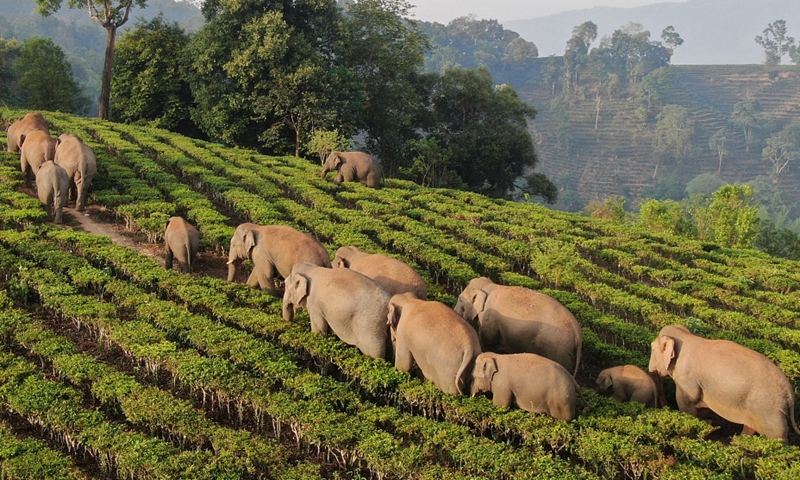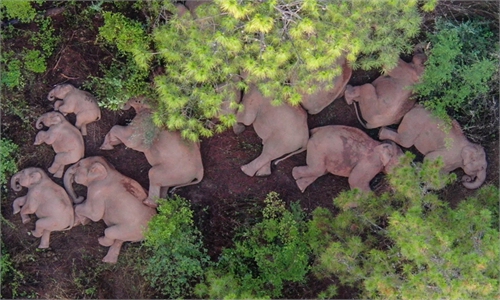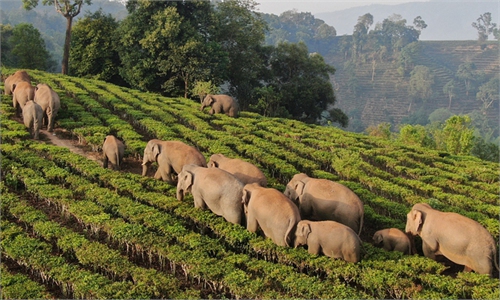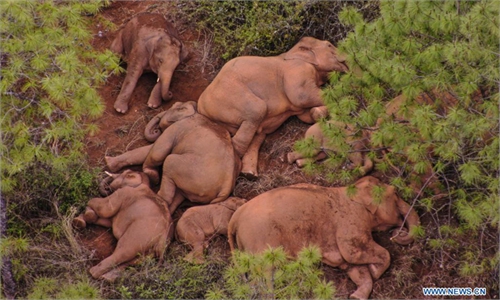Animal ‘celebrities’ melt people’s hearts
Stray elephant may be going through rebellious period: biologists

Cute elephant herd! Turning on faucet and drinking water by turns, snoozing in the fields, the migrating parade of wild Asian elephants wandering for 15 months in Southwest China's Yunnan Province has become new internet celebrities.Photo:VCG
There is no sign that China's nationwide elephant fever is going away soon, as a male elephant, which recently left the herd and wandered alone in an opposite direction, has become a new sparking point on social media.
The wandering wild Asian elephants in Southwest China's Yunnan Province are still on the road, two months after leaving their original habitat Xishuangbanna and deciding to start the longest journey in the species' history. Eating corn, gnawing sugar cane, visiting houses, taking baths… they seem to be enjoying themselves so much that they don't even want to go home.
The further northward they travel, the more followers they have on social media. As of Tuesday tens of millions of netizens, most likely including unsmiling middle-aged men, said they would like to just watch them sleep for a whole day, especially after a "black sheep" came out.
On June 7, one male elephant left the herd and began to wander alone in an opposite direction.
"After a male elephant is 6 years old, he will often leave the herd to go out and play, and the time of this departure will become longer and longer," Shen Qingzhong, an official at a local nature reserve, said.
"I really want to send my rebellious son to the wild with him to experience this kind of life," one netizen wrote.
This stray elephant reminds netizens of a famous stray elephant previously seen in Xishuangbanna. The elephant called "Lao San" was driven out of its herd in 2019 because of a failed courtship and has since become difficult, often deliberately destroying vehicles and entering crowded areas several times. There is also speculation as to whether the situation is similar for the male elephant that recently left the herd.
Zhang Li, a field wildlife biologist and professor on mammal conservation at Beijing Normal University, pointed out that it is more likely that the male elephant left because it reached sexual maturity and thus left the herd to seek a mate.
"But since there is neither a suitable habitat nor other elephant herds nearby where mates can be found, it is expected that the elephant may still return to the larger group," Zhang told the Global Times on Tuesday.
Photo taken on Monday showed the herd continued to linger in Shijie township, Yimen county. The male elephant that strayed nine days ago was about 17.4 kilometers away from the herd, and all the 15 elephants were safe and sound.
In the latest revealed video, from higher above the ground, these brown, multi-ton, quiet, intelligent creatures were seen lying in a circle or in a pyramid shape down in the leaf-covered wild forest. With their long trunks curled up and their large ears resting on their shoulders, the adult elephants protect the young members, with all members looking calm and serene.
The elephant herd has stayed near Yimen for a week. During the day, the elephants sleep in the dense forest in the mountains. At night, they go down to the mountain to feed, and traces of the herd passing through the village at the bottom of the mountain are seen in several places.
Many people said the scene reminded them simultaneously of the stillness of nature and the warmth of interspecies relationships.
The local nature reserve official said that the elephants stayed in Yimen probably because it is in a river valley with a hotter climate, and there are also many crops for elephants to eat such as plantain and sugar cane, making the herd reluctant to leave.
A local official surnamed Shen said that the government has recently provided the elephant herd with a large amount of food. "This is not to change the elephants' food habits, but to keep them from going to villagers' homes for food and creating human-elephant conflicts."
Starting from their original habitat, the Xishuangbanna National Nature Reserve in Yunnan's southernmost prefecture, on April 16, the elephants have wandered more than 600 kilometers northward. It's the furthest that a herd of wild elephants from Xishuangbanna has ever travelled from its habitat.
For over a month, local authorities have sent police to escort the herd, evacuated roads to facilitate its passage, and used food to distract it from entering densely populated areas.
But as the herd has moved too far from its original habitat, and Yunnan has entered the rainy season making it difficult to cross rivers, it is unlikely that the elephants will return to their original habitat soon, Zhang said.



